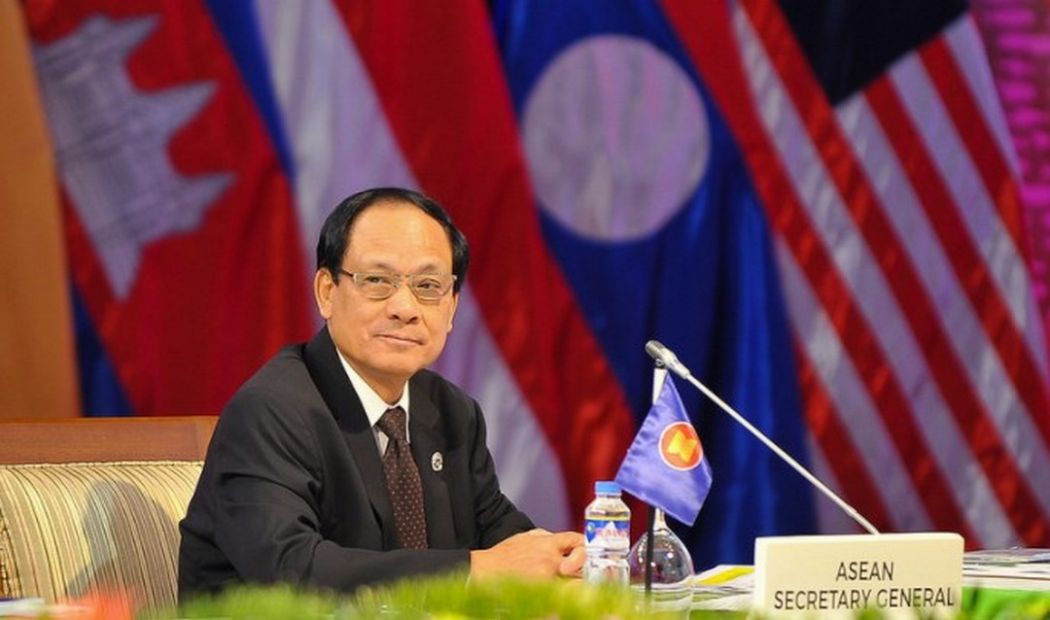China on Sunday scored a diplomatic coup in its campaign to weaken regional resistance against its sweeping claims to the South China Sea when Southeast Asian nations issued a diluted statement on the dispute and agreed to Beijing’s terms on talks.
After two days of tense meetings on the dispute in the Philippine capital, foreign ministers from the 10-member Association of Southeast Asian Nations (ASEAN) issued a joint communique that diplomats involved said was carefully worded to avoid angering China.

The release of the statement came shortly after the ministers met with Chinese Foreign Minister Wang Yi and agreed on a framework for conducting negotiations on the decades-long row that included key clauses advocated by China.
“This is an important outcome of our joint effort,” Wang told reporters as he celebrated the agreement.
China claims nearly all of the strategically vital sea, through which $5 trillion in annual shipping trade passes and is believed to sit atop vast oil and gas deposits.
Its sweeping claims overlap with those of ASEAN members Vietnam, the Philippines, Malaysia and Brunei, as well as Taiwan.

China has dramatically expanded its presence in the contested areas in recent years by building giant artificial islands that could be used as military bases, raising concerns it will eventually establish de facto control over the waters.
In what two diplomats involved said was another victory for Beijing on Sunday, ASEAN members declined to say in their joint statement that the hoped-for code of conduct with China be “legally binding”.
Vietnam, the most determined critic of China on the issue, had insisted during two days of negotiations that ASEAN insist the code be legally binding, arguing otherwise it would be meaningless.
The ASEAN ministers failed to release the joint statement as expected after meeting on Saturday because of their differences on the sea issue, with Vietnam pushing for tougher language and Cambodia lobbying hard for China.
“Vietnam is adamant, and China is effectively using Cambodia to champion its interests,” one diplomat told AFP on Sunday as negotiations extended into overtime.
Consensus struggle
Tensions over the sea have long vexed ASEAN, which operates on a consensus basis but has had to balance the interests of rival claimants and those more aligned to China.

Critics of China have accused it of trying to divide ASEAN with strong-armed tactics and chequebook diplomacy, enticing smaller countries in the bloc such as Cambodia and Laos to support it.
The Philippines, under previous president Benigno Aquino, had been one of the most vocal critics of China and filed a case before a UN-backed tribunal.
The tribunal last year ruled China’s sweeping claims to the sea had no legal basis.
But China, despite being a signatory to the UN’s Convention on the Law of the Sea, ignored the ruling.
The Philippines, under new President Rodrigo Duterte, decided to play down the verdict in favour of pursuing warmer ties with Beijing. This in turn led to offers of billions of dollars in investments or aid from China.
“It’s clear that China’s pressure on individual ASEAN governments has paid off,” Bill Hayton, a South China Sea expert and associate fellow with the Asia Programme at Chatham House in London, told AFP.
Hayton and other analysts said the agreement on a framework for talks on Sunday came 15 years after a similar document was signed committing the parties to begin negotiations.

The 2002 document was more strongly worded against China.
China used those 15 years to cement its claims, while continuing to get ASEAN to issue ever-weaker statements of opposition, according to the analysts.
“It would appear China has never lost in terms of seeing the language of ASEAN forum statements being toned down,” Ei Sun Oh, adjunct senior fellow at the S. Rajaratnam School of International Studies in Singapore, told AFP.
Philippine academic and security analyst Richard Heydarian expressed stronger sentiments as he summarised Sunday’s developments: “Overall it’s a slam dunk diplomatic victory for China”.
